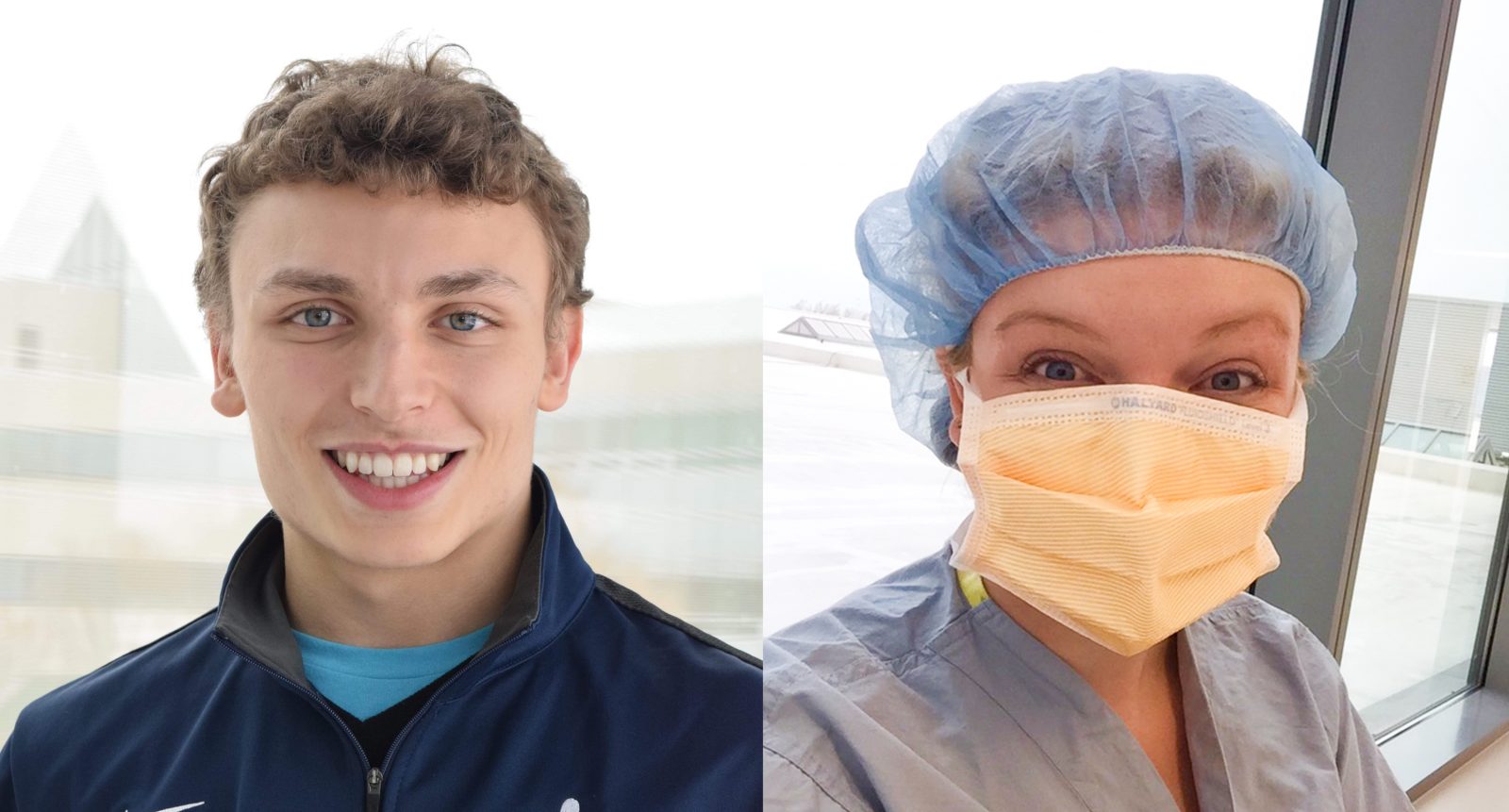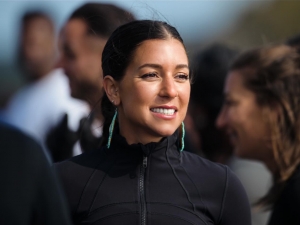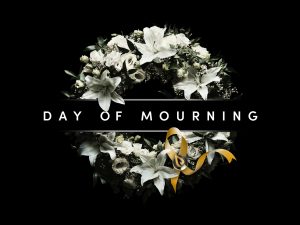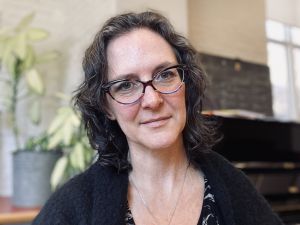 Faculty of Applied Health Sciences Student Association (FAHSSA) President and fourth-year Kinesiology student Aaron Wexler and FAHSSA Vice-President and fourth-year Nursing student Lisa Mochrie are working to ensure undergraduate students continue to stay engaged this year despite pandemic challenges.
Faculty of Applied Health Sciences Student Association (FAHSSA) President and fourth-year Kinesiology student Aaron Wexler and FAHSSA Vice-President and fourth-year Nursing student Lisa Mochrie are working to ensure undergraduate students continue to stay engaged this year despite pandemic challenges.Looking at ways to maximize opportunities for interdisciplinary collaboration, the Faculty of Applied Health Sciences Student Association (FAHSSA) has been constantly adapting its professional development and networking events to ensure undergraduate students have the best possible online experiences despite in-person limitations and delays created by the COVID-19 pandemic.
“Among the notable accomplishments of the FAHSSA, this academic year has seen a record-breaking number of students engaged in our programming,” says Association President and fourth-year Kinesiology student Aaron Wexler. “We’ve had more than 300 undergraduate students from all departments in the Faculty involved in a variety of virtual activities.”
Working closely with FAHS Dean Peter Tiidus and Associate Dean, Teaching and Undergraduate Studies Kirsty Spence, some of this year’s successes include the expansion of a Faculty-wide mentorship program, an inter-departmental student case competition and leadership roles in online incoming student orientation and recruitment events via Instagram.
“Having to choose just one initiative that stands out is almost impossible,” says Wexler. “We have so much to be proud of this year as we’ve gained momentum, but definitely our inaugural Case Challenge generated a lot of excitement and teamwork.”
The inaugural FAHS inter-departmental student Case Challenge, which took place on Jan. 16, saw faculty members and alumni take on roles as judges and panelists to support three mixed teams of students from Health Sciences, Kinesiology, Nursing, Recreation and Leisure Studies, and Sport Management programs.
“We began thinking about hosting an inter-departmental health challenge back in August 2019 when we were still meeting in-person,” explains FAHSSA Vice-President and fourth-year Nursing student Lisa Mochrie. “Aaron and I were inspired by our volunteer opportunities in the Brock community as well as my clinical experiences with Niagara Health. We wanted to introduce students to the value of collaboration across the Faculty while completing a challenge that is relevant to the Niagara region.”
While receiving guidance from Associate Professor of Nursing Jenn Salfi — who teaches Foundations of Collaboration and Teamwork, a fourth-year course offered to any student enrolled in a FAHS degree program — FAHSSA began looking forward to the Niagara 2022 Canada Summer Games and the opportunities it will afford Brock students and alumni.
This inspired further collaboration with alumni in the role of guest judges. Drawing expertise from the FAHS Dean’s Advisory Council, Brock grads Jeff Dykeman (BSM ’05), Daniel Bordenave (BKin ’11, MSc ’15) and Stefanie Pavlovich (BPhEd ’10, BEd ’10, MEd ’11) helped align the Case Challenge with the need to fill volunteer leadership roles at the upcoming games.
“Mimicking a real-life scenario gave the competitors a tangible exercise to participate in,” says Mochrie. “Having assigned teams with representation from each department allowed students to draw on their own expertise and see where it overlaps with other programs within our Faculty.”
By nurturing passion and creating challenges that needed to be overcome, the organizers and judges were then able to challenge participants to get them thinking critically.
“We created a safe environment whereby we were able to stir the pot a bit to generate important conversations,” says Wexler. “On seeing all the different perspectives, it really reinforces why Brock needs courses that allow students from all programs in our Faculty to enrol.”
One outcome of the Case Challenge was that participants began to recognize how their programs overlapped with others across the Faculty.
“It was a thrill to watch our participants form connections with one another through the interdepartmental teams,” says Wexler.
Participants have since reported the Case Challenge was beneficial to their experiential learning and that connections made outside the classroom have resulted in newly formed friendships and virtual coffee dates.
“Our Faculty has some exceptional students willing to go over and above for the benefit of collective learning through experiential education,” says Tiidus. “The positive outcomes of this event have laid the groundwork for future opportunities and I am pleased that several of our alumni dedicated time to the professional development of our students, especially during these complicated circumstances.”
Another key area that has seen much growth this year is mentorship. Originally, started as separate departmental programs in 2017, the FAHS Mentorship program was launched Faculty-wide the following year with the intention of pooling existing resources to expand student opportunities for more professional development and networking opportunities.
“We have been very pleased to see the interdisciplinary approach to mentorship as both initially popular and having undergone immense growth across the FAHS since its inception,” says Spence. “The initial program grew to a point to generate several other collaborative projects, where students have been able to shine as leaders and develop their capacity.”
The positive response to this initiative led to the need for a more formalized organizational structure, thus the FAHS Student Association was created in January 2019.
“Students who enter the Faculty of Applied Sciences know they have a solid platform to stand on to both meet fellow mentee students in their cohort and be mentored by some of the best students in their department,” says Spence. “The program helps orient incoming students toward success from the start of their academic journey.”
Keeping a firm lens on the benefits of mentorship, FAHSSA recently established the Brock-McMaster Collaborative Medical School Mentorship program, through which aspiring medical students receive mentorship from those enrolled at McMaster’s Niagara Regional Campus of the Michael G. DeGroote School of Medicine — located in the Roy and Lois Cairns Health and Bioscience Research Complex on Brock’s main campus.
“The Niagara Regional Campus is grateful to collaborate with Brock University in many ways and our medical students are enthusiastic in encouraging undergraduate students interested in pursuing careers in medicine,” says Regional Assistant Dean Amanda Bell.
Additionally, the student association played a large role in establishing the FAHS Graduate Studies Mentorship Program, a program where mentorship is provided to fourth-year undergraduate students looking to pursue a master’s degree and first-year master’s students are mentored by a second-year master’s or PhD students.
“As students, Brock is really helping to shape our future journey in new and innovative ways,” says Mochrie. “I am grateful the administrative leadership is encouraging students to shape our educational journey in a way that is relevant to the future professional workplaces we will be employed in.”









